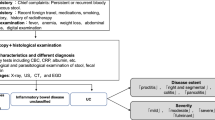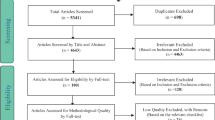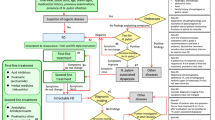Abstract
Background
Lifestyle factors, including diet, exercise, substance use, and sexual activity, have been shown to influence risk of inflammation and complications in inflammatory bowel disease (IBD), including Crohn’s disease (CD) and ulcerative colitis (UC). Little is known about their potential role in abdominal pain generation in IBD.
Aims
We performed this study to evaluate for relationships between lifestyle factors and abdominal pain in quiescent IBD (QP-IBD).
Methods
We performed a retrospective analysis utilizing data from our institution’s IBD Natural History Registry (January 1, 2017–December 31, 2022). Endoscopic evaluation, concurrent laboratory studies and surveys were completed by participants. Demographic and clinical data were also abstracted.
Results
We identified 177 consecutive patients with quiescent disease (105 females:72 males; 121 with CD:56 with UC) for participation in this study, 93 (52.5%) had QP-IBD. Compared to patients with quiescent IBD without pain (QNP-IBD, patients with QP-IBD exhibited no significant differences in IBD type, location, severity or complication rate. Patients with QP-IBD were more likely to have anxiety/depression (55.9% vs. 32.1%, p = 0.002) and to use antidepressants/anxiolytics (49.5% vs. 21.4%, p < 0.001). They were also less likely to engage in exercise at least three times per week (39.8% vs. 54.8%, p = 0.05) or participate in sexual activity at least monthly (53.8% vs. 69.1%, p = 0.04). On logistic regression analysis, antidepressant and/or anxiolytic use was independently associated with QP-IBD [2.72(1.32–5.62)], while monthly sexual activity was inversely associated [0.48(0.24–0.96)].
Conclusion
Lifestyle factors, including the lack of sexual activity and exercise, are significantly associated with QP-IBD. Further study is warranted to clarify the relationships between these factors and the development of abdominal pain in quiescent IBD.
Graphical Abstract

Similar content being viewed by others
Data availability
Not applicable.
Code availability
Not applicable.
References
Bielefeldt K, Davis B, Binion DG. Pain and inflammatory bowel disease. Inflamm Bowel Dis 2009;15(5):778–788.
Coates MD et al. Abdominal pain in ulcerative colitis. Inflamm Bowel Dis 2013;19(10):2207–2214.
Zeitz J et al. Pain in IBD patients: very frequent and frequently insufficiently taken into account. PLoS One 2016;11(6):e0156666.
Coates MD et al. Abdominal pain in quiescent inflammatory bowel disease. Int J Colorectal Dis 2021;36(1):93–102.
Bogale K et al. Symptoms associated with healthcare resource utilization in the setting of inflammatory bowel disease. Sci Rep 2022;12(1):10577.
Schirbel A et al. Impact of pain on health-related quality of life in patients with inflammatory bowel disease. World J Gastroenterol 2010;16(25):3168–3177.
Kim ES et al. Predictive factors of impaired quality of life in Korean patients with inactive inflammatory bowel disease: association with functional gastrointestinal disorders and mood disorders. J Clin Gastroenterol 2013;47(4):e38-44.
Mikocka-Walus AA et al. The effect of functional gastrointestinal disorders on psychological comorbidity and quality of life in patients with inflammatory bowel disease. Aliment Pharmacol Ther 2008;28(4):475–483.
Minderhoud IM et al. IBS-like symptoms in patients with inflammatory bowel disease in remission; relationships with quality of life and coping behavior. Dig Dis Sci 2004;49(3):469–474. https://doi.org/10.1023/B:DDAS.0000020506.84248.f9.
Hay JW, Hay AR. Inflammatory bowel disease: costs-of-illness. J Clin Gastroenterol 1992;14(4):309–317.
Kappelman MD et al. Direct health care costs of Crohn’s disease and ulcerative colitis in US children and adults. Gastroenterology 2008;135(6):1907–1913.
Ramos-Rivers C et al. Association between telephone activity and features of patients with inflammatory bowel disease. Clin Gastroenterol Hepatol 2014;12(6):986-994 e1.
Peery AF et al. Burden and cost of gastrointestinal, liver, and pancreatic diseases in the United States: update 2018. Gastroenterology 2019;156(1):254-272 e11.
Deberry JJ et al. Abdominal pain and the neurotrophic system in ulcerative colitis. Inflamm Bowel Dis 2014;20(12):2330–2339.
Keohane J et al. Irritable bowel syndrome-type symptoms in patients with inflammatory bowel disease: a real association or reflection of occult inflammation? Am J Gastroenterol 2010;105(8):1788.
Vivinus-Nebot M et al. Functional bowel symptoms in quiescent inflammatory bowel diseases: role of epithelial barrier disruption and low-grade inflammation. Gut 2014;63(5):744–752.
Goodhand JR et al. Mood disorders in inflammatory bowel disease: relation to diagnosis, disease activity, perceived stress, and other factors. Inflamm Bowel Dis 2012;18(12):2301–2309.
Halpin SJ, Ford AC. Prevalence of symptoms meeting criteria for irritable bowel syndrome in inflammatory bowel disease: systematic review and meta-analysis. Am J Gastroenterol 2012;107(10):1474–1482.
Rozich JJ, Holmer A, Singh S. Effect of lifestyle factors on outcomes in patients with inflammatory bowel diseases. Am J Gastroenterol 2020;115(6):832–840.
Lopes EW et al. Lifestyle factors for the prevention of inflammatory bowel disease. Gut 2022;72:1093.
Sun Y et al. The contribution of genetic risk and lifestyle factors in the development of adult-onset inflammatory bowel disease: a prospective cohort study. Am J Gastroenterol 2023;118(3):511–522.
Bhagavathula AS et al. Impact of body mass index on the development of inflammatory bowel disease: a systematic review and dose-response analysis of 15.6 million participants. Healthcare (Basel) 2021;9(1):35.
Chan SSM et al. Obesity is associated with increased risk of Crohn’s disease, but not ulcerative colitis: a pooled analysis of five prospective cohort studies. Clin Gastroenterol Hepatol 2022;20(5):1048–1058.
Limketkai BN et al. Dietary patterns and their association with symptoms activity in inflammatory bowel diseases. Inflamm Bowel Dis 2022;28(11):1627–1636.
Yelencich E et al. Avoidant restrictive food intake disorder prevalent among patients with inflammatory bowel disease. Clin Gastroenterol Hepatol 2020;20(6):1282–1289.
Engels M, Cross RK, Long MD. Exercise in patients with inflammatory bowel diseases: current perspectives. Clin Exp Gastroenterol 2018;11:1–11.
Lamers CR et al. Repeated prolonged moderate-intensity walking exercise does not appear to have harmful effects on inflammatory markers in patients with inflammatory bowel disease. Scand J Gastroenterol 2021;56(1):30–37.
Carney H et al. Prevalence and risk factors of substance use disorder in inflammatory bowel disease. Inflamm Bowel Dis 2021;27(1):58–64.
Mantzouranis G et al. Alcohol and narcotics use in inflammatory bowel disease. Ann Gastroenterol 2018;31(6):649–658.
Sands BE. From symptom to diagnosis: clinical distinctions among various forms of intestinal inflammation. Gastroenterology 2004;126(6):1518–1532.
Zigmond AS, Snaith RP. The hospital anxiety and depression scale. Acta Psychiatr Scand 1983;67(6):361–370.
Ghazi LJ, Patil SA, Cross RK. Sexual dysfunction in inflammatory bowel disease. Inflamm Bowel Dis 2015;21(4):939–947.
Zhao S et al. Inflammatory bowel diseases were associated with risk of sexual dysfunction in both sexes: a meta-analysis. Inflamm Bowel Dis 2019;25(4):699–707.
Chan D et al. Inflammatory bowel disease and exercise: results of a Crohn’s and Colitis UK survey. Front Gastroenterol 2014;5(1):44–48.
Sharma P et al. Effect of yoga-based intervention in patients with inflammatory bowel disease. Int J Yoga Therap 2015;25(1):101–112.
Saibeni S et al. Imaging of the small bowel in Crohn’s disease: a review of old and new techniques. World J Gastroenterol 2007;13(24):3279–3287.
Coffey CJ et al. Inclusion of the mesentery in ileocolic resection for Crohn’s disease is associated with reduced surgical recurrence. J Crohns Colitis 2018;12(10):1139–1150.
Rivera ED et al. The mesentery, systemic inflammation, and Crohn’s disease. Inflamm Bowel Dis 2019;25(2):226–234.
Zhan YL, Zhan YA, Dai SX. Is a low FODMAP diet beneficial for patients with inflammatory bowel disease? A meta-analysis and systematic review. Clin Nutr 2018;37(1):123–129.
Funding
This research was supported by the Peter and Marsha Carlino Early Career Professorship in Inflammatory Bowel Disease, the Margot E. Walrath Career Development Professorship in Gastroenterology and the National Institutes of Health (National Institute of Diabetes and Digestive and Kidney Diseases (NIDDK) R01DK122364).
Author information
Authors and Affiliations
Contributions
MC developed the conceptual framework for this study, assisted with and oversaw data collection and analysis in addition to assisting with writing and editing the manuscript. SD assisted with writing and editing the manuscript. VW assisted with data analysis and helped edit the manuscript. AS assisted with data collection and organization, and assisted with editing the manuscript. AT, EW and KC assisted with collection of data, providing the conceptual framework of the study and editing the study.
Corresponding author
Ethics declarations
Conflicts of interest
The authors of this manuscript have no relevant conflicts of interest or financial disclosures to report.
Ethical approval
This study was performed in accordance with the ethical standards as laid down in the 1964 Declaration of Helsinki and its later amendments and approved by the Pennsylvania State University College of Medicine Institutional Review Board.
Informed consent
Written informed consent was obtained by all individual participants included in this study.
Consent for publication
Every patient involved in this study signed a consent form to participate in research work that could eventually be published.
Additional information
Publisher's Note
Springer Nature remains neutral with regard to jurisdictional claims in published maps and institutional affiliations.
Rights and permissions
Springer Nature or its licensor (e.g. a society or other partner) holds exclusive rights to this article under a publishing agreement with the author(s) or other rightsholder(s); author self-archiving of the accepted manuscript version of this article is solely governed by the terms of such publishing agreement and applicable law.
About this article
Cite this article
Coates, M.D., Dalessio, S., Walter, V. et al. Lifestyle Factors Associated with Abdominal Pain in Quiescent Inflammatory Bowel Disease. Dig Dis Sci 68, 4156–4165 (2023). https://doi.org/10.1007/s10620-023-08075-0
Received:
Accepted:
Published:
Issue Date:
DOI: https://doi.org/10.1007/s10620-023-08075-0




